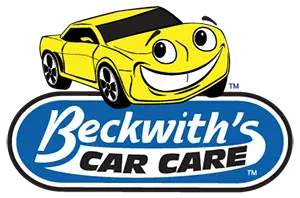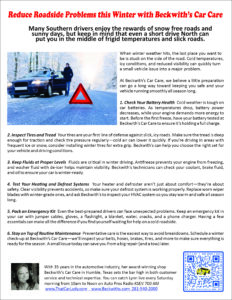Every time you press the brake pedal your vehicle’s computers gather data from sensors, fluid is pushed through brake lines and ultimately friction material is pressed together to slow your vehicle. Sound complicated? It is, but the professional qualified technicians at Beckwith’s Car Care will make it easy for you.
Why should I get my brakes inspected or replaced?
Your vehicle’s brakes are designed to wear out. The friction material on the pads and shoes in your brake system is made to rub against the rotors or drums and wear down a little every time you use your brakes, very similar to the way the soles of your shoes wear out scraping against the pavement. It is important to keep an adequate amount of friction material. As the friction material on your brakes’ pads and shoes wears away harder components are sometimes damaged by hard use, worn parts and heat.
When should I get my brakes inspected or replaced?
While most of us don’t give our brakes a second thought until they don’t work properly or most commonly when they start making noise it is best to have them inspected on a regular basis. We inspect your brakes at every oil change and/or tire rotation. Every customer and vehicle brakes differently. Our professional technicians will measure and note the thickness of your friction material at each visit. It helps you plan for your next brake maintenance – no surprises – and keeps your vehicle stopping at peak performance. You can frequently avoid costly repairs by catching problems early.
What causes my brakes to shudder or shake?
Vehicles are equipped with two basic braking systems, disc or drum, and sometimes a combination of both. In disk style systems friction pads are pressed against a rotor that spins with the wheel. It resembles a dinner plate. In drum style systems a friction shoe is used to press outward on the inside of a drum. The drum is a bit like a large mixing bowl. In both cases, rotors and drums can warp and become “out of round.” As they spin the friction surface presses against them and if they are warped will encounter high and low spots. This uneven surface will cause a pulsation or vibration that you will feel inside the vehicle.
My brakes made a squealing sound, but now it went away?
Most brake pads have a wear indicator built in to help warn you that the friction material is getting thin. It presses against the rotor and alerts you with an annoying sound. If you continue to wear past the indicator the noise may stop. Get your brakes inspected as quickly as possible. When the friction material becomes thin it can damage more expensive components. Brake inspections are always FREE at Beckwith’s Car Care. With brakes it is always safer to know what is going on than to risk driving a vehicle with ineffective or inefficient brakes.
Why does it get more expensive if I try to get all the life out of my brakes as I can?
While we would never suggest you replace your brakes too soon, it is far too easy to push them past their usable life and cause additional problems in your braking system. Having a professional inspection will take the guess work out of your decisions. By replacing the friction material (pads or shoes) and resurfacing the rotors or drums you can frequently avoid having to replace these more expensive components. As vehicles have downsized and as manufacturers work to reduce weight we have noticed changes in the way rotors and drums are made – they are smaller, thinner and lighter. This means that they are more susceptible to wear.
Your Solution – Today’s automotive braking systems utilize hydraulic, mechanical and electronic components to stop your vehicle faster and safer than ever before. No matter what your brake system needs you have our assurance that we will use quality parts that meet and frequently exceed the manufacturer’s recommendations and still fit your budget. Our technicians are trained ASE Certified professionals and are dedicated to keeping your vehicle running and stopping on the road – safe and dependably. Ask one of our service professionals about a complete brake system inspection today.
281-540-2000







